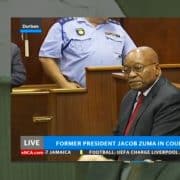|
Getting your Trinity Audio player ready...
|
The Seriti Commission into South Africa’s arms deal is our zero for this week for its failure to expose and curb grand corruption. The commission released its 700-plus-page report last week, after four years of the inquiry into alleged corruption in the deal. It could find no trace of corruption and declared the deal to be completely above board.
The commission had initially been expected to take two years to complete its investigation and its irregular proceedings – during which evidence leaders and members of staff alike abandoned the process – cost the taxpayer over R100-million.
The Strategic Defence Procurement Packages, the country’s largest procurement project by far, saw government embarking on a mission to buy arms equipment in the 1990s. It is hardly believable that such a massive deal – costing over R70-billion – could not have had elements of corruption within it.
“This is an extraordinary outcome,” said Corruption Watch executive director David Lewis in reaction to the report findings. “The ‘inferences’ that the commission claimed that it was unable to draw were already there in several criminal convictions related to the deal, in the initial charges levelled against President Zuma by the National Prosecuting Authority, in the obscene sums paid to South African ‘consultants’ and held in foreign bank accounts, and, in the clear acknowledgement by some key foreign suppliers of suspicious payments to its ‘consultants’.”
The commission started probing the matter in 2012 at Zuma’s request. Although some saw this move as a noble one, the Mail & Guardian reported at the time that Zuma had later told the ANC’s national executive committee that his decision was meant to prevent the Constitutional Court from taking charge of the matter and prescribing the terms of reference for him. The court was expected to rule – just days after the announcement – on activist Terry Crawford Browne’s application to force Zuma to reopen the investigation into the deal.
The manner in which the commission has addressed the allegations around the arms deal procurement raises critical issues around the scrutiny of public procurement processes to ensure that they comply with Section 217 of the Constitution, which mandates that all procurement is fair, equitable, transparent, competitive and cost-effective.
• President Jacob Zuma receives the arms deal report from Judge Willie Seriti and Judge Thekiso Musi, 30 December 2015. Image from GovernmentZA on Flickr.








